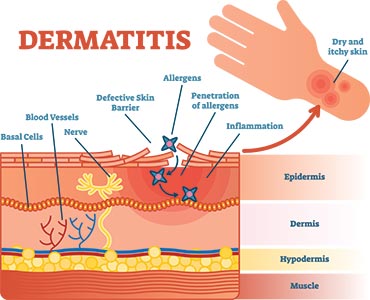Causes Of Itchy Skin
If you have dry skin, you may have experienced itchiness, especially during winters. If there are no severe rashes or blisters that develop and the itch vanishes the moment you moisturise your skin, then it probably is because of the dryness. However, if you observe bumps, wheals or an infection when you scratch, the causes may be different. Here are some main causes of itchy skin:
Psoriasis: The word psoriasis itself means ‘itch’ in Greek and is a skin infection that's associated with itchy skin. In fact, most psoriasis patients suffer from wounds and severe rashes due to constant scratching. Dermatologists also recommend using heavy creams and lotions to lock in the moisture and help soothe the itchiness and irritation.
Hives: These appear in the form of red swollen wheals or bumps on various parts of the body and cause severe itchiness. Hives can be a result of a reaction to allergens and sometimes the reasons are unknown. Whilst hives generally last for a day or less, you can experience burning and stinging sensations along with itching.
Pregnancy: Women often complain about itchy skin during pregnancy and the frustration associated with it. Increase in the blood flow to the skin, stretching of the skin in the womb area or in some cases liver diseases can cause itchy skin during pregnancy. It's advisable to opt for herbal remedies to soothe the itchy skin during pregnancy for the overall well-being of you and your baby.
Eczema: It's one of the most common conditions that cause itching in adults. Woollen clothing, high humidity and harsh chemicals in cosmetics or detergents are all common triggers of eczema. (Read: Natural remedies to get relief from Eczema)
Scabies: Scabies is a skin infection caused by a certain type of mite, and scratching the infected area can often lead to further spreading. Irritated skin, blisters and rashes are common symptoms of this condition and to make it worse it can be contagious too.
Natural Solutions To Get Relief From Itchy Skin
The good news is that you can get relief from itchy skin with over-the-counter treatments. For severe cases or if it's caused due to some illness, you may need a visit to the dermatologist. For all other conditions, using natural creams, gels or lotions can potentially provide relief from itchy skin and may also prevent it from spreading further. The biggest advantage of using all natural products for itchy skin is that they're free from unwanted side effects. Alongside using a natural remedy, here are some simple ways you can help deal with your itchy skin:
- To prevent further damage to the skin, tap the areas that feel itchy instead of scratching them.
- It’s best to keep nails trimmed and clean if you suffer from itchy skin. This will prevent rashes and blisters if you accidentally scratch the affected area.
- Cool showers or holding a damp towel can give some instant relief from itchy skin.
- Avoid spicy foods, caffeine and alcohol to avoid aggravating the condition further.
- Essential oils for itchy skin can be used during baths and along with your shampoo or conditioners to avoid itching caused by dandruff. You can also add a few drops to home diffusers to keep allergens and bacteria at bay or to your foot soaks to get rid of itching due to foot infections. These are ideal for dealing with infections caused by warts, ringworm, jock itch or thrush.
- Replacing your body wash or soap with all natural soaps formulated with ingredients that soothe the scratch and can help provide relief from itchy skin.
- When suffering from skin infections like psoriasis, eczema, hives or frequent allergies, switch your everyday cleansing products with a complete range of natural, perfume-free products that can include a gentle soap, face wash, hand wash, body wash and cream. Using an entire range of these products can help get relief from symptoms of these skin infections and soothe itchy skin.
- Honey is one of the best natural moisturisers and antibacterial cooling agents. Look out for products or creams with this amazing ingredient on their list to avoid side effects of chemical-laden over-the-counter creams.
Although most skin conditions leave no long-term effects, certain infections such as ringworm and scabies can lead to serious health risks if left untreated, not to mention becoming more painful and visible. When deciding on the right treatment for you, it’s important to remember that you should read the list of contents prior to use, in order to ensure you aren't allergic to any of the ingredients contained in the product. After beginning treatment, take care to check for unusual spots or blisters on the body and if you do notice any, end use of the product and consult your doctor for advice before re-starting treatment.
Tips To Prevent Further Itchiness Of Skin
While you care for your itchy skin with the above mentioned natural solutions, it's also important to follow a few everyday habits to prevent aggravating the condition.
- Wear loose fitting cotton clothes and undergarments. Wool or other rough fabrics can irritate your skin further and aggravate itching.
- Use humidifiers at home and in offices to maintain the humidity and prevent skin from drying as it can lead to further itching.
- Don't use hot water for bathing as it causes the skin to dry up and worsen the itching. Bathing with lukewarm water is advisable.
- Check the ingredients of all your cosmetics, creams and lotions. Harsh ingredients and chemicals used for fragrance and colour can irritate the itchy skin which is why you should switch to mild, fragrance-free products.
The Final Word
Skin imperfections can be uncomfortable and embarrassing to live with, particularly on unclothed parts of the body such as the face. The best method of reducing the symptoms of skin problems is to recognise the symptoms early and begin combative treatment, allowing you to overcome the problems and eliminate the threat of further spreading. It's worth bearing in mind that some fungal skin problems cannot heal naturally, so fighting the condition is vital. Other skin conditions such as warts cannot be cured – sufferers will always be susceptible to future outbreaks of itching. However, applying all natural topical treatments can help provide some relief and soothe the skin.


